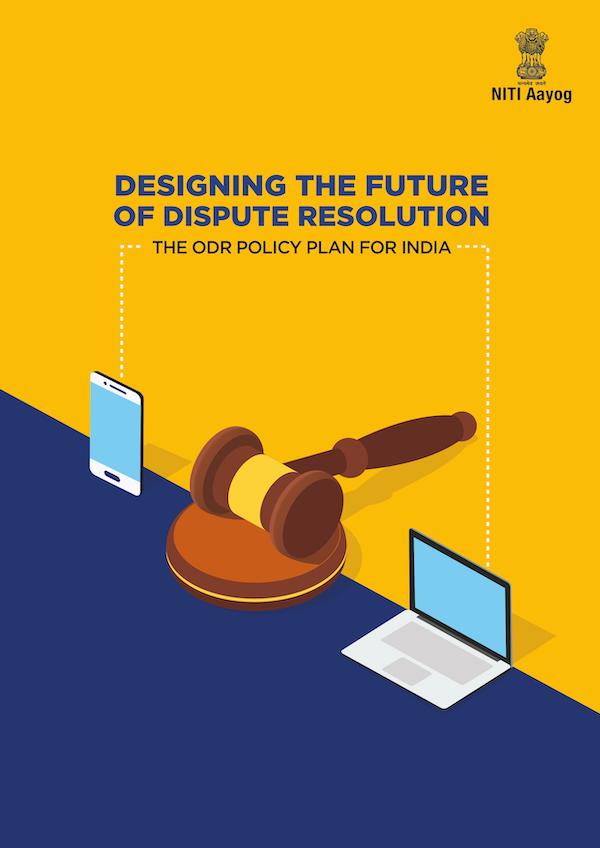Sahamati’s role in building the AA ecosystem recently got validated, when Niti Aayog, in its Expert Committee Report on Online Dispute Resolution (ODR), acknowledged Sahamati model as a potential model that a proposed SRO for ODR can adopt.
The NITI Aayog Expert Committee on ODR published a report in October 2021 (Designing the Future of Dispute Resolution – THE ODR POLICY PLAN FOR INDIA). The report quotes:
Another, more consolidated, self-regulatory model that has seen some early success comes in the form of a self-regulatory organisation (SRO) in the realm of account aggregators. The SRO, Sahamati is a collective of the account aggregator ecosystem and has been set up as a not for profit private limited company. The organisation co-creates strategic goals and executes it through working groups. It is governed by a charter and regulates those organisations, which have been recognised by the RBI.

This report introduces the concept of ODR, briefly traces its evolution and also discusses its benefits. It provides a detailed discussion with a repository of international use cases for ODR that provide a solid foundation for precedents and leading practices. It discusses the present status of ODR in India, discussing contributions of the entire stakeholder ecosystem in advancing the various facets of ODR.
The Report then discusses structural, behavioural and operational challenges that ODR in India currently faces. This discussion on challenges is organically followed by the critical section on recommendations where augmenting accessibility, building capacity, creating trust, designing regulatory frameworks, and finally the phased implementation are discussed for ODR in detail.
RBI’s Banking Ombudsman Annual Report 2021
A quick, transparent, and effective ODR is one of the fundamental pillars of a healthy and customer-responsive system. RBI’s Banking Ombudsman annual report 2021 highlights the benefits of digital platforms for grievance redressal, known as (ODR – online dispute resolution), introduced in the banking sector. The report highlights the impact of the newly introduced ODR system in terms of a sharp reduction in the cost of redressal and a significant reduction in the turnaround time (TAT). As per the report, the average cost of handling a complaint under the banking ombudsman scheme decreased by 33.5% from Rs 2,412 during July 1, 2019-June 30, 2020, to Rs 1,605 during July 1, 2020-March 31, 2021.
Sahamati’s ODR Framework
The driver for techno-legal framework for Sahamati ODR is the Reserve Bank of India Master Directions governing account aggregators. RBI licenses and registers account aggregator companies. RBI master directions govern the financial information providers (FIPs), the financial Information users (FIUs), the account aggregators (AAs) and the way financial consumers can utilize such services. Such Master Directions also controlling the extent and purpose of which their data is shared and used’.
AA framework will transform the Indian financial services landscape, with its ability to give a single platform where a customer can collate and manage access to his or her financial information. This obliviates the need for FIUs to reach out to multiple FIPs individually or rely on the customers to arrange the information for them. Further, the consumers can manage and limit the sharing and usage of data by giving time-bound consent. In this manner, the AA framework is bound to be a win-win situation for the customers and lenders. Moreover, the framework allows lenders to build cost-effective digital products for customers, who are currently under-served utilizing the services of AA which are already pre-connected to an extensive network of FIPs.
Sahamati (Sahamati), a collective of account aggregation ecosystem, is actively building all critical technological and legal components of the AA ecosystem
- Utilizing a revolutionary open-architecture multipartite contractual framework (dubbed ‘ecosystem terms’) enabling easy signup by the three sets of financial institutions – FIPs, FIUs and AAs – which eliminates bilateral negotiation and contracting process among or between them, and instead interlinks all three sets of financial institutions with uniform, standard terms (based on the RBI Master Directions)
- Principles of interoperability, interdependency and reciprocity captured in the ecosystem terms among the Participants which are also a reflection of the technical standards envisaged in the Sahamati AA ecosystem
- The ecosystem acknowledges the evolutionary nature of the entire system and seeks to incorporate continuous changes and innovation based on experience, feedback, and further technological advances
- Building of an advanced, multi-tiered dispute resolution process built on a parallel techno-legal advancement that has taken place: automation dispute resolution and online dispute resolution.
As the AA system gets rolled out, it may result in significant cross-sectoral and multi-stakeholder involvement in all financial transactions. Sahamati has been proactive in appreciating the nuances of such complexity and has already started work towards building a robust AA dispute resolution process. The Sahamati AA dispute resolution process aims to provide the required comfort and confidence to the financial consumers while interacting with the Sahamati AA Ecosystem on potential or actual issues, concerns, complaints, grievances, or disputes that may arise.
—
NITI Aayog is the premier policy think tank of the Government of India, providing directional and policy inputs. Apart from designing strategic and long-term policies and programmes for the Government of India, NITI Aayog also provides relevant technical advice to the Centre, States, and Union Territories.
Sahamati is a not-for-profit organization, the industry alliance for the Account Aggregator ecosystem, which is working on putting in place all pillars required to build a dynamic, robust and versatile AA ecosystem